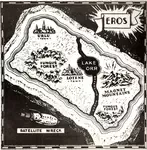A Good Analysis
by Dylan Jeninga
(Illinois, Wisconsin)

Get to the Martians already!
That seems to sum up Heinlein nicely, thanks! My friend is thinking of making a science fiction short story into a short film, and I was helping him choose the tale.
In other performance news, a theater company near my home is putting "A Princess of Mars" on the stage. I'm only sad I didn't hear about it sooner! I will of course be in attendance, and I will let everyone know how I enjoyed it.
I'm nearly through "Mars" by Ben Bova. The Mars stuff is well done, Bova manages to make geology and international politics interesting, and of course anything involving Martian life is gripping.
That said, there are a few things that take me out of the story.
The first is the incredible sex drives of almost all of the characters. I'll not begrudge a book sex, it's part of the human experience - but astronauts on Mars and the officials behind them really out to spend more time thinking about their momentous undertaking. Sexual competition is a theme of the book, and it feels a bit out of place.
My second problem arises from the other thing the book's characters think far too much about: their ethnicity. The reader may be forgiven if he or she enjoys an old novel with unfortunate racial segments by making allowances for the work's chronological point of origin. However, blatant racism is not the only way to mishandle characters of diverse backgrounds in a story. "Mars"'s sin is to make every non-Caucasian character able to think about their heritage and little else. I can't find the exact passage, but I recall that at one point the protagonist, who is Navaho by descent, thinks about how the Martian cliffs look like the sort of place his ancestors might have built adobe cities. Moments later, he mentally remarks that the rocky spires around him resemble totem poles. After that (but not much after) he imagines Navaho deities descending on the scene. All that, despite his grandfather being his only intermittent tie to the culture of his ancestors. And he's not the only one, the several other characters behave in similarly unrealistic fashion. If I were a character in "Mars", boulders would look like windmills to me and I would wear wooden shoes over my spacesuit. It's simply not how people think.
All this isn't to say that it's not an enjoyable book. It's depiction of Martian exploration is good enough that I haven't put it down yet, and some of the characters are likable enough to root for them (particularly Vosnesenseky, a well drawn tough-guy-who-occasionally-betrays-a-human-heart). I don't think we'll be adding it to the list of classics, however.
{Z: We live in an unfortunately obsessed period, in which writers tend to feel impelled to parade their liberal credentials instead of just trusting the inner light of their humanity to shine through naturally. That's why female characters are so often repulsive - it's a virtue-signalling message from the writer, "Look at me, look how non-sexist I am." Contrast this with a real non-sexist future as depicted in the excellent "Hub" universe of James H Schmitz: there (around 3500 A.D.), the whole species has moved on, the equality of the sexes is no longer an issue; the fight has been won so long ago that women can be thoroughly attractive and equal at the same time.
There is also another issue, of which I am reminded by your interesting piece of news about "A Princess of Mars" being put on the stage. (No, I am not going to speculate about the theatre company's chances of recruiting a fifteen-foot actor to play Tars Tarkas.) Old-style writers like ERB wrote about characters who, for all their faults, had something which today's protagonists seem always to lack. To say what it is, I'll have to use the d-word. Dignity.
I haven't read the Ben Bova book you've described, but I can just imagine the contrast if John Carter were transported into it. The Bova cast of characters would no doubt consider him to be a bloodthirsty maniac; but meantime, what would he think about them? An interesting thought.}






























